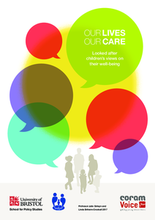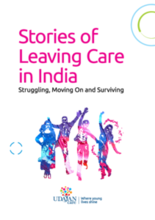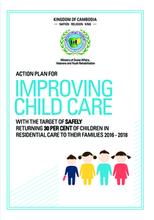Displaying 741 - 750 of 962
This paper presents qualitative findings of the resilience processes of young women who have left the care of Child and Youth Care Centres in Gauteng, South Africa.
The present study tested whether family finding, as implemented in North Carolina from 2008 through 2011, improved child welfare outcomes for youth at risk of emancipating foster care without permanency.
This report presents the findings of research conducted by Child Soldiers International to assess the effectiveness of release, psychosocial recovery and reintegration interventions (commonly referred to as ‘DDR’) for girls associated with armed groups in eastern Democratic Republic of Congo (DRC).
This report summarises the findings from the 611 children and young people who completed the Bright Spots’ ‘Your Life, Your Care’ survey on their experiences in care.
This collection of poetry and writing throws the spotlight on living 'in care' - a subject rarely explored in literature and yet experienced by more than 60,000 children in the UK every year.
The aims of the study were to examine the experiences and outcomes of young adults, aged 16-26, who had lived, or continued to live, in kinship care in the UK.
The case studies outlined in this publication draw upon earlier work, which suggested that young people leaving care may broadly fall into one of three groups: those successfully ‘moving on’ from care; those who are ‘survivors’; and those who are ‘strugglers’.
This video shares the story of two siblings reintegrated from an orphanage in Myanmar through the ACCIR Kinnected Program.
This Action Plan for improving child care, with the target of safely returning 30 per cent of children in residential care to their families 2016 - 2018, was developed to support the implementation of the Ministry of Social Affairs, Veterans and Youth Rehabilitation (MoSVY) Work Platform 2014–2018 and the Sub-Decree 119 on the Management of Residential Care Institutions, which was endorsed on 11 September 2015.
This study contributes to the emerging body of South African literature on care leaving, as it explores the future selves and resilience factors of young people who are still in residential care and who are about to exit the statutory system.





